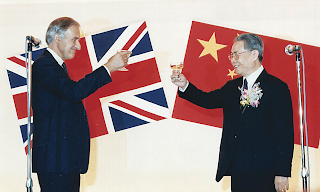Xu Jiatun 許家屯: From Revolutionary to Refugee
It is with great pleasure that the Chinese Historical Museum welcomes the bonafide Communist revolutionary who became the highest member of the Chinese Communist Party (中国共产党 CCP) to defect to the United States.
 Xu Jiatun joined the party in 1938, rose through the ranks of the People’s Liberation Army in the wars against Japan and the Nationalists, suffered denunciation and demotion during the Cultural Revolution of the late 1960s, was rehabilitated and eventually appointed head of the Xinhua News Agency 新華通訊社 (and the underground CCP) in Hong Kong in 1983, and fled to the U.S. in 1990 after sympathizing with Hong Kong people demonstrating in solidarity with pro-democracy protesters in Tiananmen Square 天安門廣場.
Xu Jiatun joined the party in 1938, rose through the ranks of the People’s Liberation Army in the wars against Japan and the Nationalists, suffered denunciation and demotion during the Cultural Revolution of the late 1960s, was rehabilitated and eventually appointed head of the Xinhua News Agency 新華通訊社 (and the underground CCP) in Hong Kong in 1983, and fled to the U.S. in 1990 after sympathizing with Hong Kong people demonstrating in solidarity with pro-democracy protesters in Tiananmen Square 天安門廣場. It boggles the mind to think of all the history Xu has experienced in his 94 years. Not only can he offer an insider’s view on twentieth century mainland Chinese politics, but he also can share the gut-wrenching transition from citizen to refugee, cadre to dissident, East to West, and the realization that one can never go home again.
The general story of exile will be familiar to many of our Chinese American museum members whose families fled the communist regime, but most of them left for Hong Kong, Taiwan, and the United States as the Nationalist forces were being pushed off the mainland. Indeed, this will be the first time the museum has hosted a speaker from the other side of this conflict.
Of course, the museum welcomes members of all political leanings, but we resolutely avoid the treacherous waters of modern Chinese politics. I could not imagine hosting a party apparatchik nor an anti-communist crusader, nor any lecture related to the acrimonious issues surrounding Taiwan, Tibet, nor even the smallest rock in the South China Sea. However, the combination of Xu’s party membership and his defection allow him to reflect on both sides of the issues and, hopefully, help to soothe the ongoing ideological strife through the dispassionate lens of historical hindsight.
Arriving in the United States at the age of 74, one can only imagine the adjustment Xu went through after being denied a request for a quiet retirement in his native Jiangsu Province. In the first weeks after his arrival, Xu claimed that he was in the U.S. to conduct research, and the CCP announced that he was vacationing. Both agreed that he had not defected and would return home.
 After scrupulously avoiding the media for two years, Xu published a memoir advocating political reforms just before the three year anniversary of the Tiananmen Square Protests. But even as he aligned himself with the CCP’s opponents, Xu only called for adopting some Western and capitalist-inspired ideas in order to save Chinese socialism, a process he compared to Franklin Roosevelt’s New Deal, which he and others credit with preserving the American capitalist system through publicly funded social programs. In 1997, he joined others in appealing to the party congress to reassess its condemnation of the 1989 protests, and his criticism of the regime has grown ever since.
After scrupulously avoiding the media for two years, Xu published a memoir advocating political reforms just before the three year anniversary of the Tiananmen Square Protests. But even as he aligned himself with the CCP’s opponents, Xu only called for adopting some Western and capitalist-inspired ideas in order to save Chinese socialism, a process he compared to Franklin Roosevelt’s New Deal, which he and others credit with preserving the American capitalist system through publicly funded social programs. In 1997, he joined others in appealing to the party congress to reassess its condemnation of the 1989 protests, and his criticism of the regime has grown ever since.There’s no doubt that some would find it hard to understand Xu’s 62 years of service to the party, in which he must have at least tacitly supported Mao’s policies that resulted in famine, violent purges, and mass indoctrination. Even today’s CCP agrees he was 30% wrong. But if shaking hands with protestors led to investigation and arrest in 1990, opposition would be virtually suicidal during the height of Maoism. Some naysayers could attribute his defection to political expedience and l his subsequent criticism to opportunism. Regardless of whether either of these positions contain elements of truth, what I find most remarkable is Xu’s courage in changing and speaking his mind. It is easy to stubbornly stick to one’s guns, but real courage is required to reconsider and criticize the ideals and institutions one has spent a lifetime upholding.


Comments
Post a Comment